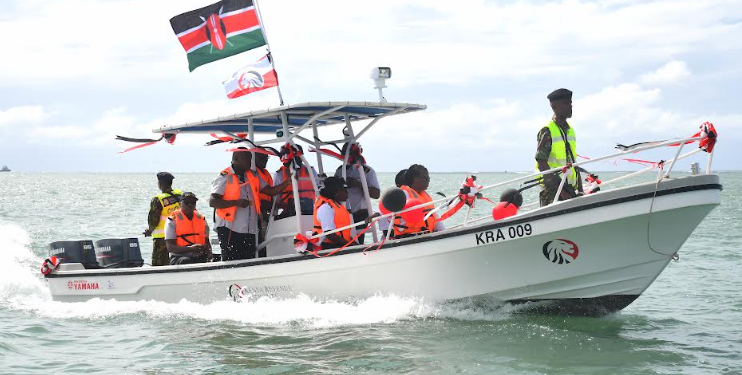The Kenya Revenue Authority has commissioned a new patrol boat, KRA 009, to strengthen its Marine Unit’s operations in securing the country’s maritime borders and curbing illicit trade along the East African coastline. The vessel was launched at the Port of Mombasa on April 14, in a move aimed at enhancing surveillance, improving revenue protection, and promoting lawful trade practices. This strategic asset is expected to play a transformative role in curbing illicit trade along Kenya’s maritime corridors, while also strengthening national security and promoting fair trade.
The East African coastline, particularly the Indian Ocean and inland waters like Lake Victoria, has historically been a hotspot for smuggling activities and maritime crime. These threats pose not only economic risks through the loss of critical revenue but also endanger public health and undermine national sovereignty. By deploying KRA 009, the Kenya Revenue Authority has reaffirmed its commitment to safeguarding both the economy and the well-being of Kenyan citizens.
Speaking at the commissioning of the patrol boat in Mombasa, Commissioner General Humphrey Wattanga highlighted the vessel as more than just a tool for enforcement. He described KRA 009 as a bold symbol of the authority’s unwavering resolve to ensure secure and lawful trade routes. It embodies a strategic pivot toward integrated border management, with KRA taking an increasingly proactive role in national security through collaborative, multi-agency approaches.
The launch of the boat is part of broader enhancements to the authority’s surveillance and enforcement capabilities. These efforts include investment in real-time information sharing systems, advanced risk targeting tools, installation of modern scanners at entry points, and the deployment of trained K9 units. These comprehensive interventions reflect KRA’s recognition of the complex and evolving nature of illicit trade networks and their impact on Kenya’s economy.
Importantly, KRA 009’s commissioning is already yielding tangible results. Between October and December 2024 alone, the port of Mombasa recorded over 1,160 enforcement cases, resulting in the collection of more than KSh 491 million in taxes and KSh 77 million in fines. According to Dr. Lilian Nyawanda, Commissioner of Customs and Border Control, these gains are directly tied to deliberate investments in staff training, surveillance infrastructure, and fleet expansion, such as the newly commissioned vessel.
Dr. Nyawanda emphasized the critical role of maritime enforcement in stemming the tide of smuggled goods including contraband, narcotics, and weapons, all of which compromise legitimate trade and deny the government vital revenue. She underscored that efficient border control does not only ensure regulatory compliance but also promotes equity in trade, protects consumers from harmful goods, and levels the playing field for compliant businesses.
The Marine Unit’s expanding role demonstrates how modern customs enforcement is no longer limited to ports and land borders but is increasingly dynamic and mobile. Equipped with authority to search, arrest, and seize contraband, marine officers work closely with the Kenya Coast Guard Service and other national agencies to extend law enforcement reach across Kenya’s territorial waters.
This initiative is aligned with Kenya’s long-term economic vision of creating a secure and efficient trade environment that attracts investment and fosters inclusive growth. It also supports immediate goals such as increasing customs revenue, reducing corruption, and enhancing transparency in border operations. The patrol boat contributes to building public confidence in the integrity of state institutions while reinforcing Kenya’s position as a responsible maritime actor in the region.
The KRA leadership continues to call for collaboration from both the public and private sectors, acknowledging that the fight against smuggling and tax evasion requires collective vigilance, shared intelligence, and sustained commitment. With KRA 009 now in operation, the authority is well-positioned to scale up its deterrence capacity, reduce revenue leakages, and strengthen Kenya’s maritime economy for the benefit of all.
This development stands as a testament to the power of strategic investments in security infrastructure and inter-agency cooperation in fostering resilient trade systems. By reinforcing its maritime enforcement front, Kenya is charting a course toward a safer, more prosperous, and economically empowered future.
Kenya’s foreign exchange reserves have climbed to a historic high of nearly $10.59 billion, according to the latest financial markets bulletin released by the Central Bank of Kenya...
Read moreDetails









